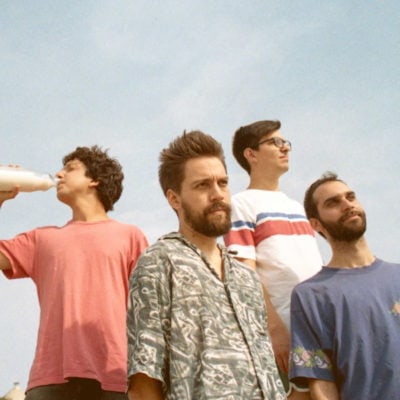
By Audrey Peshkam
Recently, I had the amazing opportunity to interview three out of four members of the band Mundaka. The band is based in Lima, Peru and is a part of the city’s small underground rock scene. The band describes their sound as rock inspired by a variety of different genres and international styles, drawing inspiration from everywhere to create a beautiful blend of what the band describes as their own unique sound of “Mundaka rock”. The band is made up of Rodrigo Vera Tudela (vocals and guitar), Richard Angeles (drums), Mateo Majluf (guitar), Lucas Stiglich (the original bassist who is currently working on his Master’s degree in England), and Rafael Sarmiento (the current bassist). All but Lucas and Rafael were present to speak with me via zoom and were kind enough to bear with my elementary level Spanish to tell me all about what’s going on in Peru, as far the pandemic goes, the global rise in anti-racism activist movements, and how these factors were impacting their music.
Recientemente, tuve la oportunidad asombrosa de entrevistar a tres de cuatro miembros de la banda Mundaka. La banda se basa en Lima, Perú y es parte de la pequeña escena de rock de la ciudad. La banda describe su sonido como rock inspirado en una variedad de géneros diferentes y estilos internacionales, inspirándose en todas partes para crear una hermosa mezcla o que la banda describe a su único sonido de “Mundaka rock”. La banda se compone de Rodrigo Vera Tudela (voz y guitarra), Richard Angeles (batería), Mateo Majluf (guitarra), Lucas Stiglich (el bajista original que ahora está trabajando en su maestría en Inglaterra), y Rafael Sarmiento (el bajista actual). Todo menos Lucas y Rafael estuvieron presentes para hablar conmigo via zoom y tuvieron la amabilidad de soportar mi nivel de español de primaria para decirme que estás haciendo en Perú con la pandemia y el aumento global en movimientos activistas de antirracismo, y también cómo estos factores han impactado su música.
They explained that the pandemic has taken quite its toll on Peru, as it has to countries all over the world. Like most of South America, Peru is currently in a strict quarantine, with hospitals filling up and doctors working harder than ever. When discussing how the people of Peru, specifically the people of Lima, reacted to the Black Lives Matter movement going on in the US, Rodrigo explained that most folks have shown great support for BLM. However, this support hasn’t really been able to extend past social media since the quarantine has been much stricter in Peru, preventing the people from being able to protest. Mateo went on to say “Peru is a super racist country” saying that the people are not new to the dangers of police brutality and government corruption. The guys said that they anticipate a great wave of protests taking place in their city when quarantine comes to end, as COVID-19 has also led people to reach a boiling point with their government and has further exposed the dangers of corruption, particularly in the form of a weak health-care system as seen also here in the US. However, Richard notes that despite the fact that they are often trying to spread a positive message, protesters in Peru are oftentimes tainted as “radical terrorists” by those who oppose them for engaging in such activities. Speaking to Mundaka about these current issues made me realize that the political climate in Peru is not as different from that in America as I would have originally expected.
Ellos explicaron que la pandemia ha pasado factura en Perú, como tiene para países por todo el mundo. Como la mayoría de Sudamérica, ahora Perú está en una cuarentena muy estricta, con hospitales llenándose y médicos trabajando más duro que nunca. Cuando se discute cómo la gente de Perú, específicamente la gente de Lima, reaccionó al movimiento de Las Vidas Negras Importan que está pasando en EU, Rodrigo explicó que la mayoría de la gente ha mostrado un gran apoyo por BLM. Sin embargo, este apoyo no ha podido extenderse más allá de las redes sociales porque la cuarentena ha sido tan estricta en Perú, impidiendo que la gente pueda protestar. Mateo continuó diciendo que “Perú es un país super racista” diciendo que la gente no es nueva en la brutalidad policial y corrupción gubernamental. Ellos dijeron que anticipan una gran ola de protestas en su ciudad cuando la cuarentena acaba, porque COVID-19 también ha llevado a la gente a alcanzar un punto de ebullición con sus gobierno y ha expuesto aún más el peligros de corrupción, particularmente en forma de un sistema de salud débil como también se ve en los Estados Unidos. Sin embargo, Richard nota que aunque a menudo intentan difundir un mensaje positivo, los manifestantes en Perú a menudo son percibidos como “terroristas radicales” por otros que oponerse a ellos por participar en tales actividades. Hablar a Mundaka sobre estos temas me hizo darme cuenta de que el clima político en Perú no es tan diferente al de Estados Unidos como había pensado originalmente.
Rodrigo, Richard, and Mateo are all currently spread out across Lima in their respective homes in an effort to social distance. Though they’ve been able to keep Mundaka active through their web presence, they all agreed that COVID-19 has made it difficult for the band to record and create new music. Richard explained that it’s a lot of production to do from home, especially when you take into consideration all the instruments and equipment that’s needed. “It’s odd but it’s different, no? And it’s good that we have new forms of playing” says Richard, highlighting the importance of technology right now in helping the band continue to work on their music. Even though the situation is very new for them, Mundaka explained that since they are a part of an underground and small music scene to begin with, they are somewhat used to already using the internet to their advantage, since popular media outlets such as the radio are not exactly beneficial to bands like theirs. “The radio only plays really popular music like pop and reggaeton, not much rock, and if there is any, it’s all from the 80s and 90s…it’s shit!” Additionally, Mateo explains that there isn’t much of an industry for music in Peru as there is in the US, as there aren’t really venues available for bands to perform in Lima. As a result, Mundaka and other bands like them mostly host shows in places like bars or houses (like a garage show we see in suburban towns like Santa Cruz) – “it’s very DIY”.
Rodrigo, Richard, y Mateo ahora están todo extendido por Lima en sus respectivas casas en un esfuerzo por la distancia social. Aunque ellos han sido capaces de mantener Mundaka activo a través de su presencia web, ellos estuvieron de acuerdo que COVID-19 la ha hecho difícil para la banda recordar y crear nueva música. Richard explicó que hay mucha producción para hacer desde la casa, especialmente cuando tomas en cuenta todo los instrumentos y equipo que necesitan. “Es raro pero es diferente, no? Y está bueno tener nuevas formas de tocar” dice Richard, destacando la importancia de la tecnología ahora en ayudando a que la banda continúe trabajando su música. Aunque la situación es tan nueva para ellos, Mundaka explicó que desde que ellos son a parte de una subterránea y pequeña escena de música, están algo acostumbrados a usar ya el internet a sus ventaja, desde que los medios de comunicación populares como la radio no son exactamente beneficial para bandas como Mundaka. “La radio FM solamente toca música tan popular como pop o reggaeton, no hay mucho rock, y si hay alguno, todo es de los 80s o 90s…es una mierda!” Además, Mateo explicó que no hay mucho de una industria por música en Perú como en los Estados Unidos, porque no hay muchos locales de música disponible para las bandas actuar en Lima. Como resultado, Mundaka y otras bandas similares sobre todo presentan conciertos en lugares como barras o casas (como un concierto de garaje nosotros vemos en los pueblos suburbanos como Santa Cruz) – “es muy DIY”.
Despite the challenges they face, Mundaka is breaking barriers and creating a unique sound that I truly believe will take them far. The band is determined to expand beyond the borders of Peru and to have their music reach other parts of the world – and clearly, they are already succeeding in accomplishing this goal! After chatting with Mundaka for about an hour, I asked if Rodrigo would play a few songs, knowing that he had his guitar handy. At the very end of our interview, he played one of my favorite Mundaka songs “Atrapado Entre La Gente” and his favorite song of theirs “Madrugada”. To hear Rodrigo sing and to hear the full interview, check out the link below!
A pesar de los desafíos que enfrentan, Mundaka está rompiendo barreras y creando un sonido único que yo realmente creo que los llevará lejos. La banda está determinada a expandir más allá de las fronteras de Perú y tener su música al
canza otras partes del mundo – y claramente, ellos ya están logrando lograr este objetivo! Después de hablando con Mundaka por una hora, pregunté si Rodrigo jugaría unas pocas canciones, sabiendo que tenía su guitarra acerca. Al final de nuestra entrevista, jugó una de mis canciones Mundaka favoritas “Atrapado Entre La Gente” y su canción favorita de los suyos “Madrugada”. Para escuchar a Rodrigo cantar y para escuchar la completa entrevista, revisa el enlace a SoundCloud abajo!

